Humza Yousaf: a challenging first year as first minister
- Published
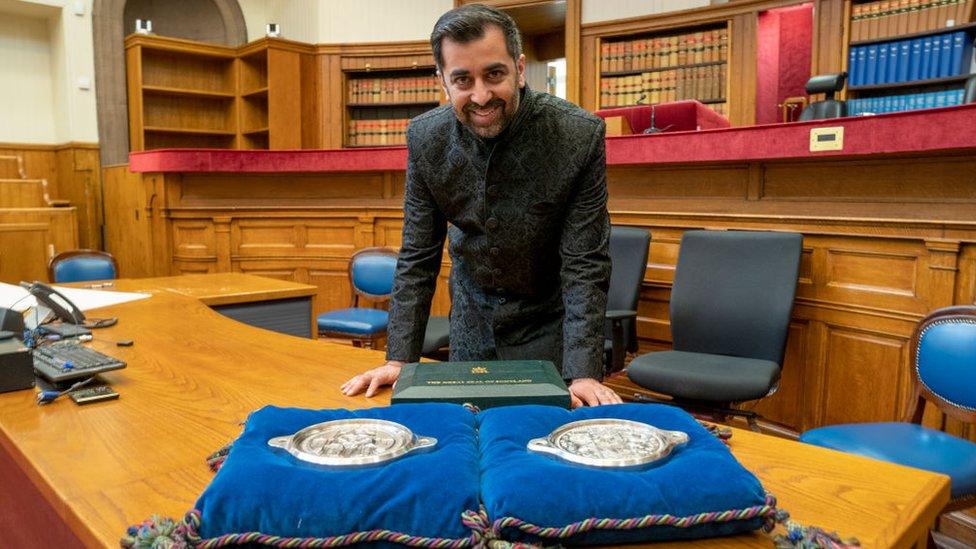
Humza Yousaf was sworn into office as Scotland's sixth - and youngest - first minister at the Court of Session a year ago.
The presiding judge, Lord Carloway, told him: "Despite the burdens of office, I hope your new role will give you great pleasure and fulfilment."
There has surely been some fulfilment over the past 12 months - but the burdens of office have often weighed heavily on the new first minister.
Despite being Nicola Sturgeon's chosen successor, he had only secured a narrow win over Kate Forbes in an often fractious SNP leadership contest.
The result of 52% to 48% in the second round of voting was closer than many had expected for the man who embraced the role of being the continuity candidate.
That lack of an overwhelming endorsement from party members seemed to immediately sap his authority - and there is a real sense at Holyrood that Mr Yousaf has been buffeted by events ever since.
He certainly couldn't have asked for a more challenging start in his new job.
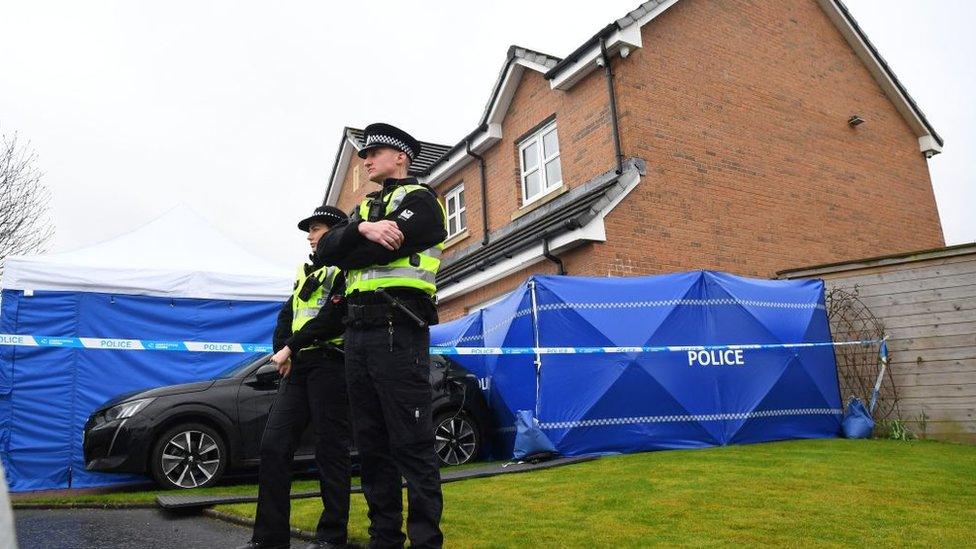
The Branchform investigation into SNP finances has cast a long shadow over Humza Yousaf's leadership of the party
Just days after he was sworn in, police searched the home of Ms Sturgeon and her husband Peter Murrell, as well as the SNP's headquarters in Edinburgh, as part of their ongoing Operation Branchform investigation into the SNP's funding and finances.
Both were later arrested and released without charge pending further investigations, but the staggering sight of a blue police evidence tent being erected in Ms Sturgeon's garden was the defining image of the early days of Mr Yousaf's leadership.
There's certainly a sense of trepidation about what happens next - with the first minister's special advisors wincing whenever Branchform is mentioned.
It set the tone for the year ahead where, even on the policy front, the government sometimes seemed to lack control.
That included dumping the Green-led deposit return scheme - although Westminster interference was blamed.
The highly protected marine areas scheme was also ditched.
Many in the party could not understand why Mr Yousaf backed his health secretary, Michael Matheson, after an £11,000 data bill was racked up on his parliamentary iPad on a family holiday - only for him to inevitably quit.
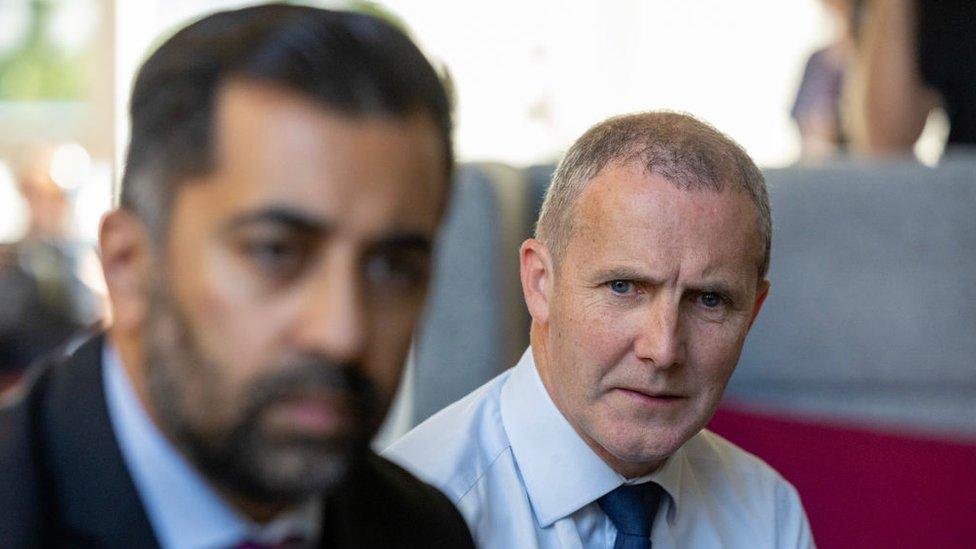
The first minister has backed Michael Matheson throughout the storm over his data charges
Another reversal came when the Scottish government lost a court battle with the UK government over its flagship gender recognition reforms, which led to the legislation being shelved.
The Rutherglen by-election - which was sparked by former SNP MP Margaret Ferrier being recalled after she was convicted of breaching Covid rules - has been Mr Yousaf's most significant electoral challenge so far.
Labour comfortably won the seat with a 20% swing from the SNP - and I was told that Operation Branchform was frequently mentioned by voters on the doorsteps.

Labour's win in the Rutherglen by-election was a bad result for the first minister
As Mr Yousaf celebrated his first year in the job this week, the controversial Hate Crime Act, which he piloted through parliament as justice secretary, is continuing to create difficult headlines ahead of the legislation coming into force on 1 April.
But even the first minister's critics say he has demonstrated leadership in some areas, most notably when his in-laws were trapped in Gaza for four weeks after the Israeli invasion, which Mr Yousaf has described as being the most difficult weeks of his life.
Mr Yousaf, the first Muslim to lead one of the UK's governments or major parties, took a significant early stand on the conflict by calling for an immediate ceasefire.
There was also praise for the leadership qualities he demonstrated in the aftermath of the Hamas attacks on Israel, when he showed solidarity with Scotland's Jewish community.
During a visit to a synagogue, he embraced the grieving mother of Bernard Cowan, who grew up in Glasgow and was killed in the kibbutz where he lived.
It made for an emotive picture.
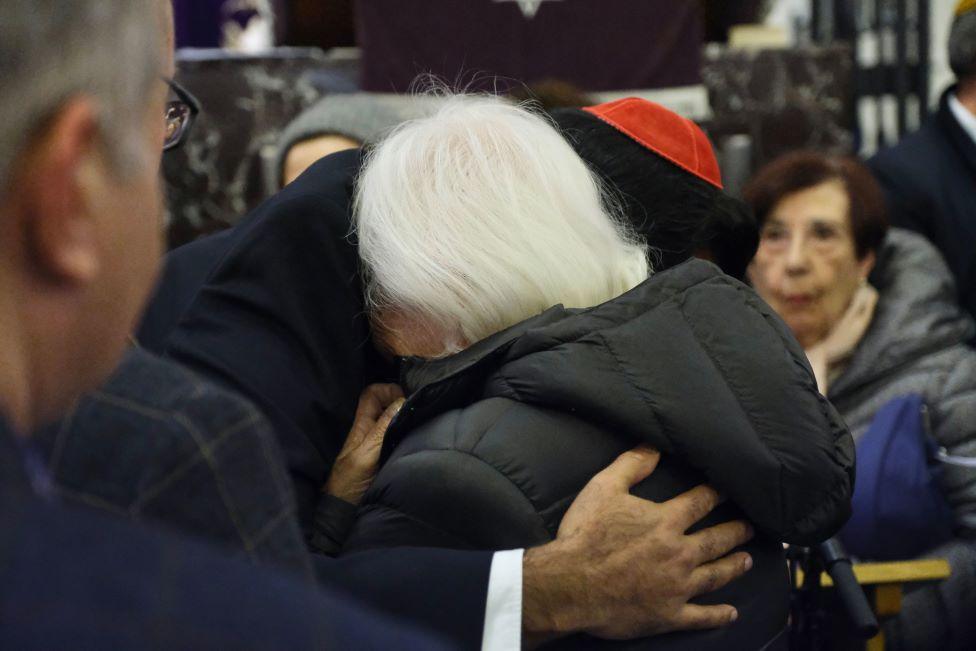
The FM was praised for his embrace of the grieving mother of Bernard Cowan, who grew up in Glasgow and was killed in Israel
This is second nature to Mr Yousaf, who has been praised for having emotional intelligence, wit and warmth.
Loyalty is also a word often associated with him, as can be seen from his continued and very public admiration of Ms Sturgeon and his willingness to stand by Mr Matheson.
The first minister points to his success in pushing through the council tax freeze he had promised, despite two local authorities having initially voted to increases charges as being one of the highlights of his year, along with estimates that his government's policies will help to lift 100,000 children out of relative poverty.
We cannot yet know how events will shape his second year in the job, particularly with the outcome of the Branchform investigation still unclear.
But what is certain is that he will face a moment of real jeopardy in the forthcoming general election, which is widely expected to be held in the autumn.
Opinion polls suggest the SNP, which has dominated Scottish politics since it first came to power at Holyrood in 2007, has a real fight on its hands from a Scottish Labour that is still buoyant after Rutherglen and eager to play its part in sending Sir Keir Starmer into Downing Street.
Mr Yousaf's party looks likely to lose seats - one recent poll suggested as many as 30 could fall - and a loss of more than 20 would potentially put him in the danger zone.
There is already concern from some within the SNP over Mr Yousaf's election strategy, with the party's longest-serving MP Peter Wishart saying he will not campaign on the first minister's call for voters to make Scotland "Tory-free".
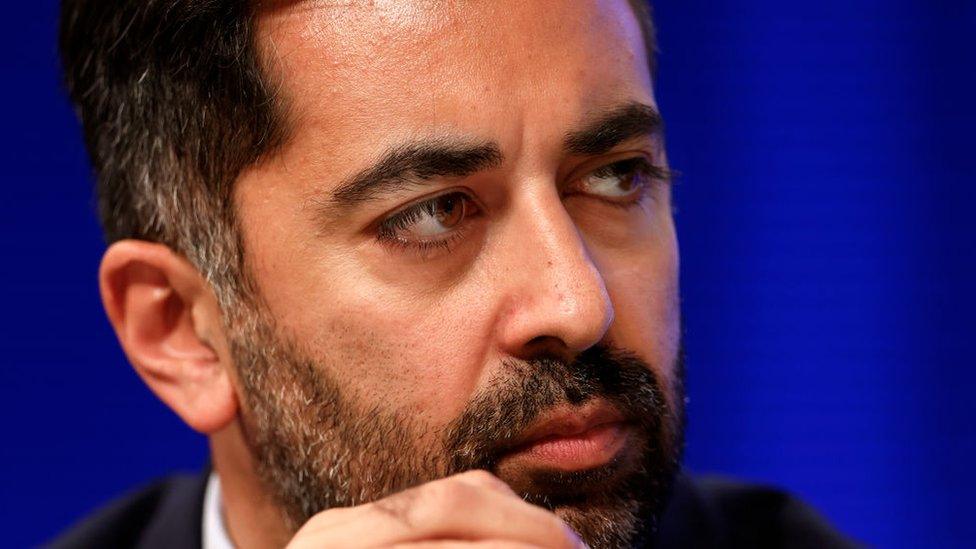
Mr Yousaf and his party face a challenging general election
And there is ongoing disquiet over his assertion that the SNP winning a majority of the seats - 29 - would be enough for him to attempt to trigger negotiations on independence with the UK government. The party won 48 seats at the last general election in 2019.
There are already rumours swirling about the erstwhile challenger Kate Forbes operating a "shadow cabinet", waiting to take over should the SNP leadership post become vacant again.
But that's easier said than done if Mr Yousaf decides to cling on to power in the face of a bad result as there's no easy party mechanism to remove him.
Ms Forbes has made regular interventions over the past 12 months but these have been more of a show of strength rather than open moves against the man who defeated her in the leadership contest.
Stephen Flynn, the SNP's Westminster leader, is also being touted as a possible challenger if he gets into Holyrood in the 2026 election.
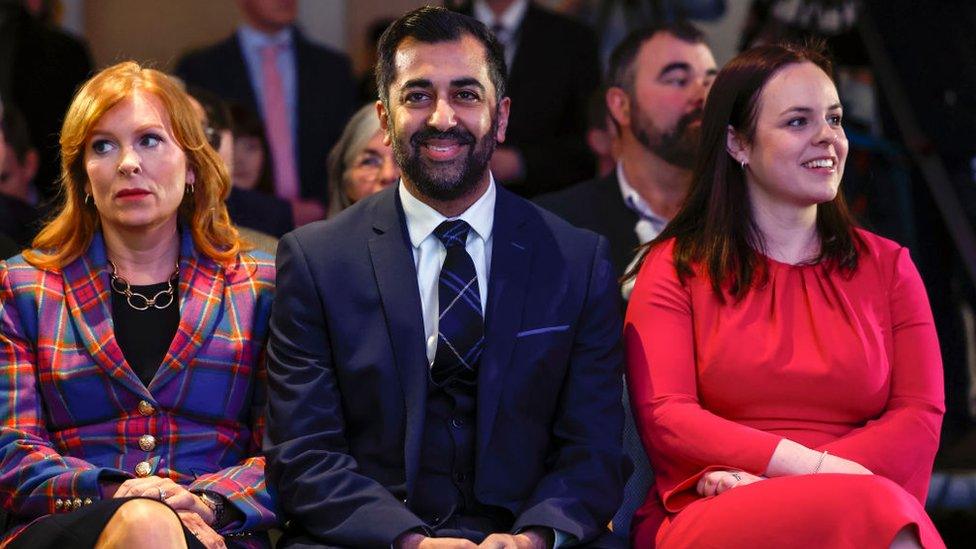
Kate Forbes (right) is seen by many as a future party leader, waiting to take over from Mr Yousaf
Mr Yousaf told me earlier this week that he still intends to be in the job this time next year.
Depending on the result of the election, the risk for the SNP could be they are left with a weakened, hobbled leader that is "in office but not in power", as one former Tory chancellor famously said.
That would set difficult ground for the next Holyrood election, when Labour would be hopeful of returning to power after so many years in the Scottish political wilderness.
The Scottish Labour leader, Anas Sarwar, who was a pupil at Hutchesons' Grammar School in Glasgow at the same time as Mr Yousaf, gave me this withering assessment of the first minister earlier this week: "He's a nice guy, he's just not up to the job."
The Scottish Conservative leader Douglas Ross was possibly even less generous, describing Mr Yousaf's first year as being "nothing short of a disaster for him, his party and - most importantly - the people of Scotland."
Mr Yousaf's supporters within the SNP - and he continues to be a popular figure - will be hoping that events are kinder to their leader over the next 12 months than they have the last.